Iodine deficiency is regarded as being the greatest cause of preventable mental retardation and brain damage. Cretinism and common goitre are among Iodine deficiency diseases (IDD). Still births, prenatal and infant mortality and hypothyroidism are linked with iodine deficiency (Vitti et al, 2001). Globally steps have been taken to increase consumption of iodine by the World Health Organisation, International Council for Control of Iodine Deficiency Disorders and the United Nations Children's Fund. Since the widespread adoption of salt iodisation in 1993 under the recommendation from ICCIDD IDD prevalence has been reduced by billions but iodine deficiencies still exist in almost every country. Deficiency can be related to food choice, geography and the availability of iodised salt. Iodine may induce hyperthyroidism; this and many other factors must be taken into consideration during iodine fortification.
Iodine is a chemical element, it is common in the forms of (I-) iodide, (IO3-) iodate and (I2) iodine, it is added to salt as either potassium/sodium iodide or potassium/sodium iodate (FSANZ, 2004).
Sea water and sea creatures are a good source of iodine as it is quite evenly concentrated, land and fresh water has an uneven distribution of iodine (ICCIDD, 2005). 5mL of iodine is all a person needs in their life span, but because iodine cannot be stored for long in the body, minuscule quantities are needed frequently. On average Australians consume 94 g/person/day iodine; this is below the recommended daily intake (RDI) (ICCIDD, 2005).
Iodine is essential for thyroid hormone production; thyroxine (T4) and triiodothyronine (T3). Consuming less than 50-70õg iodine daily shows prevalence of goitre, FSANZ recommends that Australian males consume 150õg daily, adult females' RDI is 120õg and pregnant women 145-170õg. Germany and Austria have the highest recommended daily intake with Pregnant women encouraged to consume 230õg (FSANZ, 2004). Australian RDI of...



Helpful!
Hey this essay is really helpful, just what I needed thanks a lot! n the structure of it is fab!
4 out of 4 people found this comment useful.